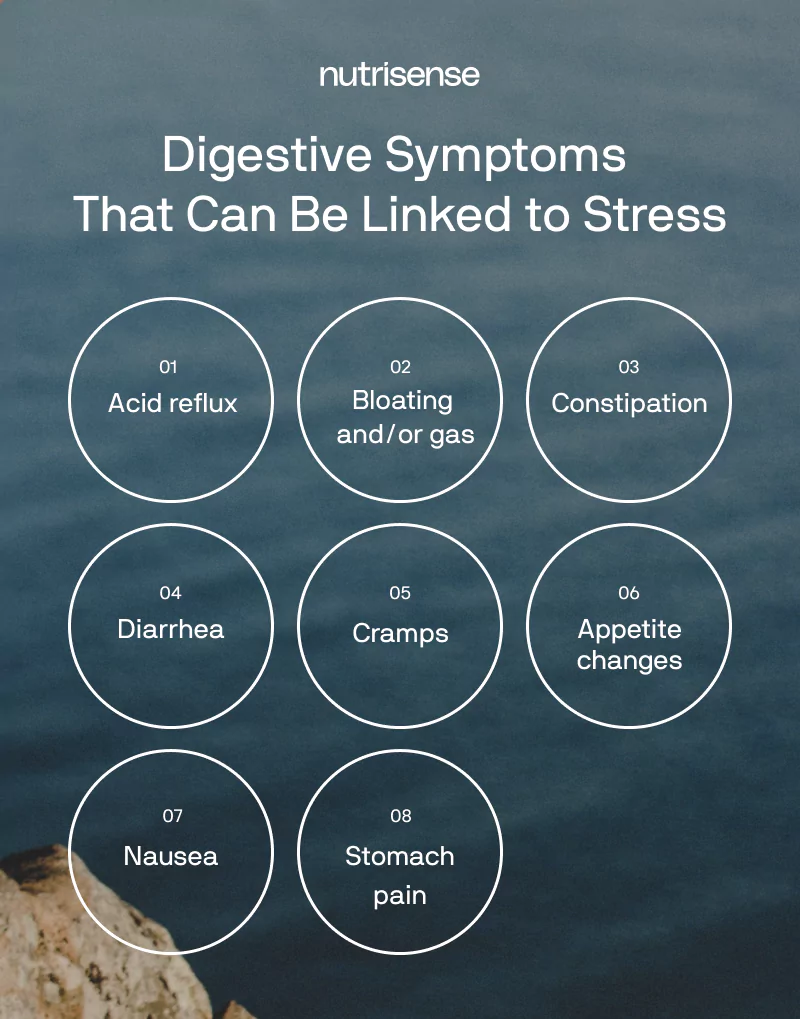The Gut-Stress Connection: The Impact of Stress on Digestive Health

Key Takeaways
What’s the relationship between gut health and stress? Though some people may believe it’s a one-way street, the connection between the two is actually a bit more complicated than it seems.
Your gut is one of the central players in your body’s stress-response system, and it plays an important role in allowing your body to adapt and orchestrate a system-wide response to stress.
Stress can come from many different sources—all of which can have direct and indirect effects on gut health and digestion. At the same time, poor gut health can itself be an added source of stress for your body.
Let’s dive into the effects of stress on the body and discover how it can impact your gut health and your overall well-being.
Understanding Stress and Its Effects

When you hear the word “stress,” what comes to mind? Chances are, you’ll immediately recall your last long day at work where you failed to meet deadlines or maybe an argument you had with a friend. These are certainly stressors, but far from the only types of stress you encounter in life.
Stress is something we all experience on a daily basis—often in ways we aren’t even aware of. How stress impacts your body depends on the intensity of the stressor and how long it lasts. In relatively short or smaller doses, stress can have beneficial effects. But with chronic exposure, especially to higher levels of stress, your body can begin to break down.
Where does stress come from? Social stressors like we described above certainly count as stress. But other stressors may include things like:
- Nutritional imbalances
- Poor sleep
- Environmental exposures to pathogens or other xenobiotic compounds or antigens
- Too much or not enough exercise
- Improperly dosed medications or supplements
There’s a certain type and amount of stress, or allostatic load, your body can tolerate before it begins to experience certain stress-induced effects. This depends on many factors, such as individual medical history, genetics or family history, and how many other stressors you are dealing with at the same time.
Symptoms of High Stress

As stress levels, or cortisol levels, rise higher over time, your body may begin to experience some of the classic symptoms of stress overload. These symptoms are associated with chronic activation of the sympathetic nervous system. These may include, but aren’t limited to:
- Mood changes
- Changes in energy, including more fatigue
- Sleep problems
- Difficulty concentrating or “brain fog”
- Gastrointestinal problems
- Impaired immune function
- Hormonal imbalances
- Changes in blood pressure, heart rate, etc.
Digestive upset is a very common symptom of stress overload. This is because part of how your body tries to adapt to chronic stress levels involves changing the function of different systems in the body, like your gut.
The Gut-Brain Axis
From the perspective of your body, digesting food isn’t a priority in the face of a high-stress, fight or flight situation like fleeing from a predator. Digestion can happen later, now it’s time to run!
As your sympathetic nervous system is activated in situations of rising stress, it can alter the following things about how your gut works:
- Gut motility and fecal transit
- Digestive enzyme production and secretion
- Blood flow to the gut
- Nutrient absorption
- Mucosal permeability
- Microbial ecosystem
- Inflammation and immune regulation
Your gut is a powerful neuroendocrine organ. Not only does it allow you to absorb and process nutrients needed for carrying out all metabolic functions, but it hosts the complex living microbiome and regulates the immune system and its response.
Your gut is also connected to the brain in what is commonly called the gut-brain axis. Many studies have begun to document the connection between gut health, mood and mental health, and memory or cognition.
The gut-brain axis is a bidirectional communication network that links different parts of your neuroendocrine system. In addition to impacting mood and memory, research suggests this axis may also influence your hormones.
The Microbiome’s Role

Your gut microbiome has a powerful role in the gut-brain axis. The microbiome includes the behavior, interactions, and function of microbial communities within your body.
Studies also show that diet may have a significant impact on your microbiome and how your microbiome influences cognitive function. Researchers have uncovered a great deal about how the microbiome works, but still have a long way to go before understanding it more fully.
What we know now is that your behaviors, environmental exposures, and genetics can all play a role in the composition of the microbiota. Stress from many sources can also shape the gut bacteria composition through changes in stress hormones, inflammation, and other nervous system changes.
Because it’s a two-way street, gut bacteria, in turn, may release chemicals or metabolites that influence your eating behavior and mood. Some have even suggested that gut bacteria may influence how you respond to stress to begin with.
Stress and Digestive Disorders
Many GI disorders and digestive issues, such as irritable bowel syndrome (IBS) have been associated with high or chronic levels of stress. As a result, poor gut health can act as its own stressor on the digestive system and gastrointestinal tract.
With this circular feedback loop, it may be important to seek a systems-based or holistic approach to addressing multiple areas of health simultaneously. Some of the most common stress-related digestive symptoms people may experience include:

- Acid reflux
- Bloating and/or gas
- Constipation
- Diarrhea
- Cramps
- Appetite changes
- Nausea
- Leaky gut
- Heartburn
- Stomach pain
Managing Stress for Gut Health
As you better understand the two-way street between stress and gut health, you may be wondering how to best address this complex interaction. The good news is that getting started may be easier than you think!
You’ll want to begin by first understanding the different possible sources of stress in your life. Taking a systems-based approach to addressing these different areas may allow you to target multiple areas at once and perhaps see faster results.
Below are some excellent strategies to consider when looking to reduce the effects of stress on gut health.
Understand How Food Impacts You

For many people, it can be very helpful to work with a qualified nutrition professional who can help you identify nutritional imbalances, including glucose imbalances, and make necessary adjustments. They can also help you assess your food tolerance and tolerance to other things like caffeine, alcohol, and supplements.
Mindful eating is another approach that shows promise for helping positively modulate the way that stress affects digestion. Mindfulness, including mindful eating, has been shown to be an effective tool for reducing certain stressors that may aggravate digestive symptoms.
Ensuring you are eating a well-balanced diet, including considering incorporating cultured foods or probiotics, may also be a way to support your microbiome.
Include Appropriate Exercise
The exact amount and type of exercise that helps you best manage stress is unique to you. Too little and too much exercise for your unique needs can both be detrimental to your stress levels. It’s important to find a balance.
Proper conditioning as well as ensuring you are fueling your body well to support your workouts are important components of exercise tolerance. If you aren’t sure if your current workouts or fueling approach is working well for you, a specialized sports nutritionist such as a sports dietitian may be a big help.
Take Stock of Your Emotional Stress

Do you notice that your digestive symptoms seem to get worse under stressful social or emotional pressures? Some stressors may be more in our control than others. Learning to draw healthy boundaries in our work and social relationships can be an important part of reducing our overall stress.
However, other mindfulness techniques may be important here as well. Some studies have shown that mindfulness-based stress reduction programs have been associated with significant reductions in physical distress, job burnout, and emotional exhaustion.
Diaphragmatic breathing or belly breathing is a simple practice that may help improve quality of life and reduce symptoms for some. In one randomized controlled study, participants with acid reflux or GERD who practiced this breathing technique saw a significant improvement in their symptoms.
Get Enough Sleep

Insufficient sleep is another common source of stress for many. If you struggle with insomnia or not feeling well-rested, it’s important to explore underlying causes.
Even though poor sleep is itself a stressor, there are many other stressors that may negatively impact sleep and lead to a vicious cycle. How and what you eat can impact your sleep as can substances like caffeine and alcohol.
Our bedtime routine can also play a big role in how easy it is to fall asleep, stay asleep, and maintain a healthy sleep schedule. Practicing good sleep hygiene is one important way to ensure you’re managing stress levels associated with poor sleep.
Find the right Nutrisense programto turn insight into progress.
Go Beyond Glucose Data with Nutrisense
Your glucose can significantly impact how your body feels and functions. That’s why stable levels are an important factor in supporting overall wellbeing. But viewing glucose isn't enough. Nutrisense, you’ll be able to learn how to use your body's data to make informed lifestyle choices that support healthy living.
One-to-one coaching
Sign up to access insurance-covered video calls to work with a glucose expert: a personal registered dietitian or certified nutritionist who will help tailor your lifestyle and diet to your goals.
Monitor and measure what matters
With the Nutrisense CGM Program, you can monitor your glucose with health tech like glucose biosensors and continuous glucose monitor (CGM)s, and analyze the trends over time with the Nutrisense App. This will help you make the most informed choices about the foods you consume and their impact on your health.
Find your best fit
Ready to take the first step? Start with our quiz to find the right Nutrisense program to help you take control.

Jordyn has a bachelor’s degree in biology, a graduate degree in Human Nutrition and completed a dietetic internship at the Memphis VA. She's a dietitian at Nutrisense, and has experience working as a clinical dietitian at a VA medical center specializing in oncology and at the Mayo Clinic, working with a wide range of patients ranging from neonates in the NICU to adult ICU.




